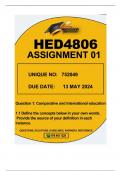, HED4806 Assignment 01 Due date: 13 May 2024 Unique number: 752049
Question 1: Comparative and international education
1.1 Define the concepts below in your own words. Provide the source of your
definition in each instance.
1.1.1 African socialism (5)
African socialism is a political and economic ideology that emphasizes collective ownership,
community development, and social welfare in African countries. It seeks to reconcile
traditional African values with modern Marxist and socialist principles.
Source: Mburu, C. (2014). African Socialism: Its Origins and Practice in Kenyan Universities.
International Journal of Educational Administration and Policy Studies, 6(4), 85-92.
1.1.2 Comparative education (5)
Comparative education is the study of different educational systems, practices, and policies in
various countries, with the aim of identifying similarities and differences and understanding the
factors that influence educational outcomes. This can involve comparing curriculum, teaching
methods, educational achievement, and the impact of social, cultural, and economic factors on
education.
Reference: Bray, M., Adamson, B., & Mason, M. (2007). Comparative education research:
Approaches and methods. Hong Kong: Comparative Education Research Centre, The University of
Hong Kong.
1.1.3 Home language (5)
Home language refers to the language or languages spoken in a person's home environment,
often the language that is most frequently used and understood by the individual and their
family. This language is typically the first language learned and the primary means of
communication within the household.
Reference:Organization for Economic Co-operation and Development (OECD). (2013). What makes
schools and education systems effective? Tertiary and adult education. Retrieved from
https://www.oecd.org/edu/school/50497977.pdf
1.1.4 Curriculum decolonisation (5)
Curriculum decolonization is the process of revising and reconstructing educational curricula to
remove or mitigate the influence of colonial and imperialist perspectives, and to accurately
represent diverse cultures and histories. This may involve incorporating indigenous knowledge and
perspectives, challenging dominant eurocentric narratives, and promoting critical thinking and
awareness of the impact of colonialism on education.
Source: Smith, Linda Tuhiwai. Decolonizing Methodologies: Research and Indigenous Peoples. Zed
Books, 2012.
1.1.5 Nyerere’s education for self-reliance (5)




